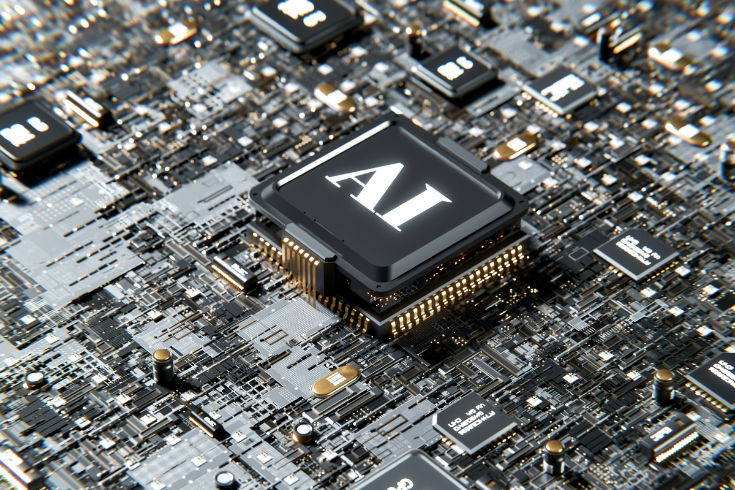Brandeis Online
AI is changing your industry. Are you ready?

September 4, 2025
For many of us, AI has become a natural part of our daily routines in 2025. Your watch or ring has kept track of your sleep cycles, gathering information on your movement, heart rate, and more. You check your email and an AI assistant has quietly sorted your messages into Important, Promotions, or Spam. Every message has a small suggested reply and when you start typing, it expects how to finish your sentence. From the search bar on social media platforms and email summaries to image editing and code creation, AI is woven into the tools and services we use at home and at work.
In the past 10 years of technological innovation, AI developers have been perfecting the simulation of human intelligence that enables artificial intelligence programs and software to learn, solve problems, and interact with human questions and stimuli. But ChatGPT and other generative AI systems usher in a new era.
According to a 2025 McKinsey report, AI has the potential to boost productivity by $4.4 trillion, yet only 1% of companies feel their AI investments have reached maturity.
“This disconnect is a wake-up call for businesses everywhere,” says Scott Stanley, EdD, Assistant Dean of Education & Learning Innovation at the Rabb School of Continuing Studies at Brandeis University. “The most successful leaders of tomorrow won’t just be familiar with AI applications; they’ll know how to maximize AI’s impact, turning it into a key driver for measurable ROI and long-term business success.”
That’s why Stanley has been so passionate about developing an AI-Driven Leadership master’s certificate at Brandeis Online, covering essential topics like ethical AI governance, data-driven decision-making, and strategic implementation.
“With the right leadership, AI stops being just another tool—it becomes a transformational force, shaping industries and redefining the future of work,” says Stanley.
The limits of AI are changing every day, breaking barriers for assistive technology and business processes. And yet, the need for people who can maximize AI software and write prompts to access information is increasingly important.
Here is how AI is changing some key industries, and how you can keep up:
Bioinformatics
In scientific fields, timing is everything. The race to discover, publish, and innovate is highly competitive. That’s why fields like bioinformatics have started incorporating AI models and machine-learning tools, to accelerate discovery and maximize employee time.
It seems intuitive. Both AI models and bioinformatics work to unlock hidden patterns and insights from complex datasets and evidence. Using AI computational tools can speed up processes, if you know what to ask. According to the National Library of Medicine, “Machine algorithms, such as support vector machines (SVM), random forests, and neural networks, are becoming widely used indispensable tools in bioinformatics.” These techniques allow researchers to attack complex challenges including identifying biomarkers, deciphering the genetic codes, and predicting protein structures and drug development.
At Brandeis Online, our Special Topics in Bioinformatics course offers cutting-edge practices and technologies including AI to students in a way that’s applicable to the industry.
Finance
Fraud is an ongoing and increasingly common issue across financial institutions. According to Alloy, more than 50% of banks, fintechs, and credit unions saw a significant increase in business fraud and over 66% saw an increase in consumer fraud in 2024. By 2027, Generative AI is expected to cost banks $40 million.
How are they fighting back? Financial institutions have started using AI for fraud detection, risk management, algorithmic trading, and personalized financial advice, according to a study by Hurix Digital. These tools do need human oversight and checking, so this means financial leadership roles will start relying on those with the AI knowledge to stay ahead of the curve.
At Brandeis Online, our AI-Driven Decision Making and Innovation course empowers leaders to leverage AI insights for strategic decision-making and fostering innovation.
Marketing
In 2025, consumers are in constant overload, hit with an endless stream of ads sponsored content. They crave genuine connection, brand authenticity, and personalized content. But that’s a tall bill to fulfill by hand. That’s where AI comes in.
Through personalized product recommendations, optimized inventory management, and chatbot customer service systems, AI has been helping marketing experts and customer relations to streamline content that filters consumer questions and needs in an efficient way. They receive more tailored content, pay attention to messaging at higher rates. They have 24/7 assistance to frequent questions. Marketing teams have more time to explore unique content initiatives.
Healthcare
For decades, experts have warned of increasing healthcare shortages, particularly in skilled physicians and nurses.. The American Hospital Association expects a shortage of about 100,000 critical health care workers by 2028. But, with a field as critical to the continuing welfare and economy of the country, a certain amount of ___ has to be upheld to avoid collapse.
To lend a hand and speed processes, AI has been helping to produce medical image analysis, personalized medicine, and remote patient monitoring. At their core, created to learn and recognize patterns, AI has become more advanced than ever at helping to monitor and diagnose patients. It’s nearly impossible for a human to memorize all medical textbooks and diagnoses, but that’s AI’s most basic specialty.
Software Engineering & IT
It sounds like the perfect loop. Software engineers build AI and then AI helps engineers create better software. Of course the reality is more complex than the simple cycle suggests.
Software-as-a-service (SaaS) AI platforms enable applications to learn historical data and predict outcomes without direct programming, meaning that developers can simply write instructions for tasks and their AI tools will take it from there. Examples of these might be personalization, predictive analysis, quality assurance, and cloud security. This frees them up to have mundane or time-consuming tasks automated and focus on things that require human insights.
As AI continues to transform industries, there is a critical need for leaders who not only understand AI technologies but can also strategically implement them to drive organizational success. AI tools can provide leaders with data-driven insights specific to their field, allowing them to make more informed decisions faster.
Designed to address the evolving intersection of leadership and artificial intelligence (AI) in today's dynamic business environment, check out Master's Certificate in AI-Driven Leadership through Brandeis Online to understand AI technologies, leverage AI for data-driven decision-making, and more.
To learn more about the Master’s Certificate in AI-Driven Leadership and other Brandeis Online programs, please visit our website.
More Stories

September 3, 2025
For Anneliese Carrascoso, a master’s degree after starting her career sounded like a recipe for failure — until she discovered the Bioinformatics program at Brandeis Online.

